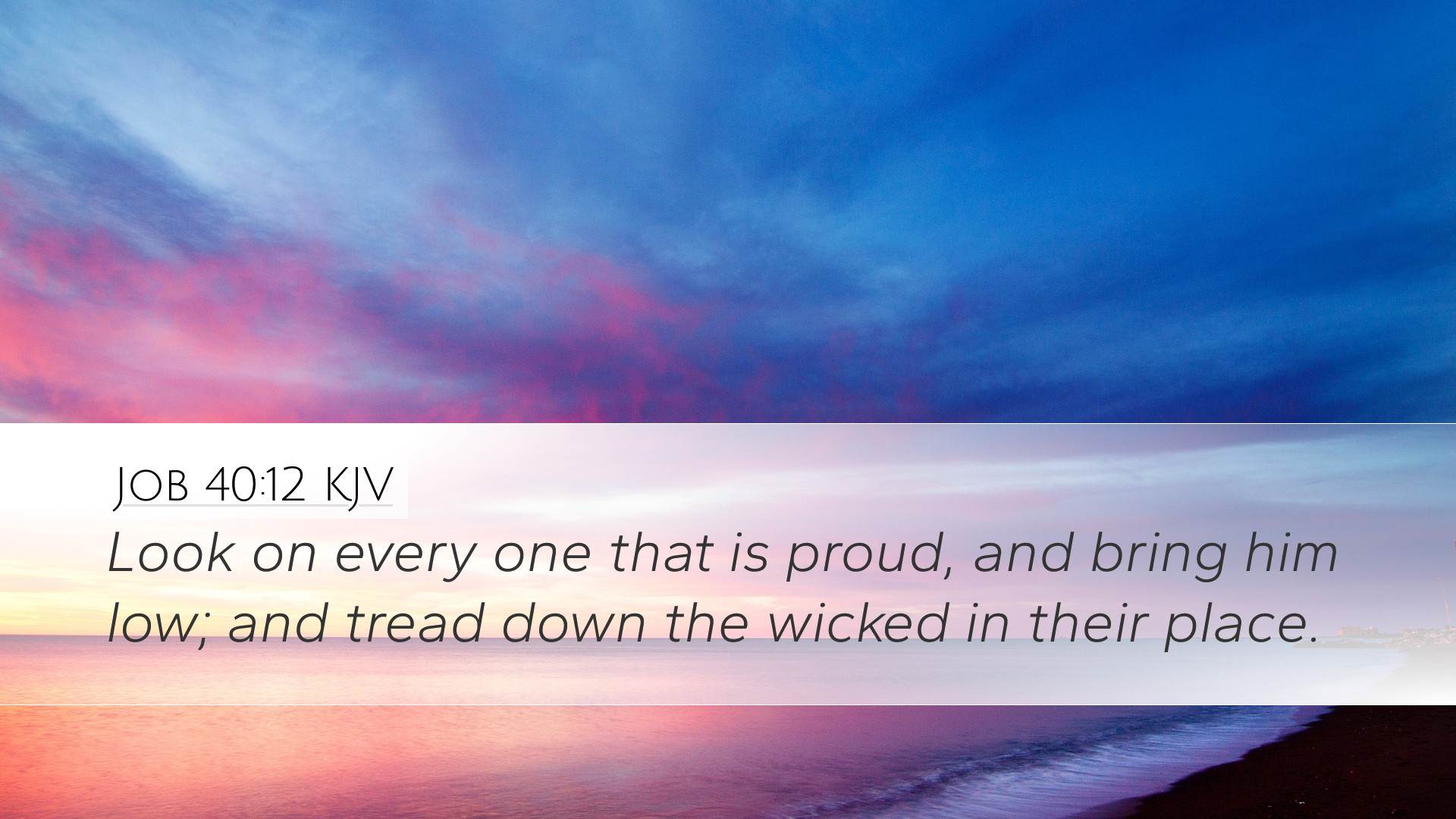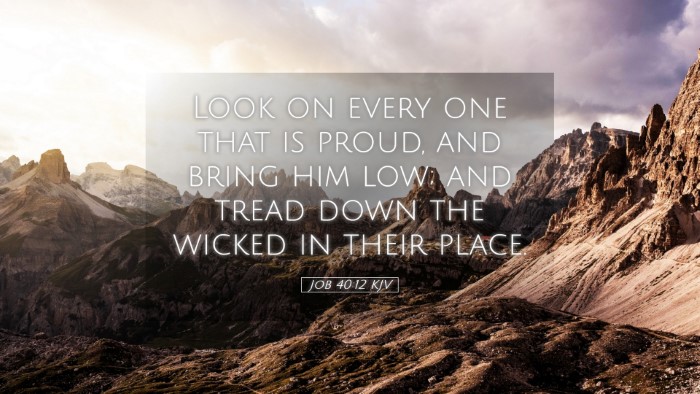Old Testament
Genesis Exodus Leviticus Numbers Deuteronomy Joshua Judges Ruth 1 Samuel 2 Samuel 1 Kings 2 Kings 1 Chronicles 2 Chronicles Ezra Nehemiah Esther Job Psalms Proverbs Ecclesiastes Song of Solomon Isaiah Jeremiah Lamentations Ezekiel Daniel Hosea Joel Amos Obadiah Jonah Micah Nahum Habakkuk Zephaniah Haggai Zechariah MalachiJob 40:12
Job 40:12 KJV
Look on every one that is proud, and bring him low; and tread down the wicked in their place.
Job 40:12 Bible Commentary
Commentary on Job 40:12
Introduction
The Book of Job stands as one of the profound literary and theological works in the Bible, exploring the complex nature of suffering, justice, and divine sovereignty. Job 40:12 offers a pivotal moment where God challenges Job to examine his understanding of justice and the divine order. This commentary synthesizes insights from esteemed scholars Matthew Henry, Albert Barnes, and Adam Clarke to elucidate the significance of this verse.
Text of Job 40:12 (KJV)
"Look on every one that is proud, and bring him low; and tread down the wicked in their place."
Contextual Analysis
The setting of this verse comes during God's second response to Job, where God presents a series of questions that emphasize His omnipotence and the limitations of human understanding. In the preceding chapters, Job, having suffered immense loss, challenged the justice of God. The verse encapsulates a part of God's challenge for Job to recognize the scope of divine authority and the reality of pride and wickedness.
Commentary Insights
From Matthew Henry
Matthew Henry emphasizes the theme of Divine Sovereignty throughout the Book of Job. In his view, Job 40:12 represents God’s command to Job to observe the proud and wicked, suggesting that only God has the authority to truly judge and punish them. Henry writes that the proud, represented as the oppressors and transgressors of God's law, are inherently bound to humility when faced with God's majesty.
He further explains that the action of "trampling" the wicked metaphorically illustrates God's power to subdue evil. This not only reassures Job of God’s ultimate authority but also serves as a reminder to all believers about the fleeting nature of human pride against divine judgment. Henry concludes with a call to humility before God's greatness, a central theme throughout the text.
From Albert Barnes
Albert Barnes offers a more theological perspective, interpreting Job 40:12 as a divine challenge to human beings concerning their understanding of justice. He notes that the proud are often those who challenge God’s ways and resist divine authority. In this verse, God invites Job to consider the severity of pride and wickedness and calls for a reexamination of his own views about divine justice.
Barnes also highlights the significance of God’s sovereignty in dealing with sin. The imagery of “treading down the wicked” signifies God’s ultimate power over all adversities and injustices. Furthermore, Barnes underscores the idea that divine authority must be accepted; to deny it is to risk bringing judgment upon oneself. Thus, this verse serves as an admonition to acknowledge God as the ultimate judge and the source of moral order.
From Adam Clarke
Adam Clarke's commentary provides a deep examination of the implications of calling upon Job to observe and reflect upon pride. Clarke suggests that this instruction reveals the nature of God’s interactions with humanity. His analysis indicates that God challenges Job to confront the realities of human arrogance and its consequences. Clarke points out that true remembrance of God's powers invites humility and a recognition of our limitations.
Clarke also elaborates on the metaphorical nature of the text. By urging Job to look upon the proud, Clarke asserts that it is an invitation for Job—and by extension, all humanity—to scrutinize their own lives. By recognizing their weaknesses in relation to God's might, believers are prompted to adopt a stance of reverence and humility. Clarke concludes that this call to action is an essential element of spiritual growth.
Theological Implications
In synthesis, the verse invites reflection on several key theological concepts:
- The Sovereignty of God: The verse underscores that God alone is the judge of human actions, reinforcing His authority over both creation and moral order.
- Pride and Humility: Job 40:12 highlights how pride ultimately leads to downfall, urging believers to pursue a life of humility before God.
- Justice and Judgment: The mention of treading down the wicked emphasizes God's role as the ultimate arbiter of justice, reminding readers of His impending judgment against all that is contrary to His nature.
- Self-Examination: The directive for Job to look upon the proud serves as a metaphor for self-examination, encouraging believers to reflect on their own attitudes and behaviors in light of divine standards.
Conclusion
Job 40:12 serves as a profound reminder of God's unassailable authority and the necessity for human humility. Leveraging the insights of Matthew Henry, Albert Barnes, and Adam Clarke, this commentary reveals the multifaceted dimensions of this verse, encouraging pastors, students, theologians, and scholars to pursue a deeper understanding of God's justice and mercy. As we grapple with the tension of faith amidst adversity, may we heed God's challenge to acknowledge Him in His fullness and majesty, addressing pride in our lives with sincere humility.


